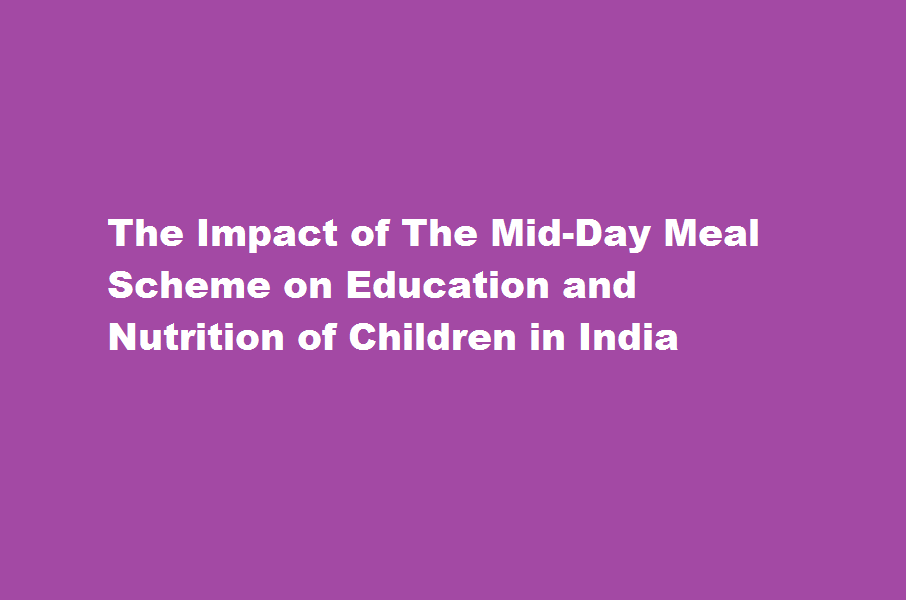The Impact of The Mid-Day Meal Scheme on Education and Nutrition of Children in India
4 min read
Introduction
Access to education and proper nutrition are vital for the overall development of children. Recognizing this, the Government of India introduced the Mid-Day Meal Scheme (MDMS). This ambitious program aims to provide nutritious meals to children in schools, ensuring their well-being and enhancing educational outcomes. In this article, we will explore the profound impact of the Mid-Day Meal Scheme on the education and nutrition of children in India.
Promoting School Attendance
The Mid-Day Meal Scheme plays a crucial role in promoting school attendance among children, especially those from disadvantaged backgrounds. By providing free and nutritious meals, the scheme acts as a strong incentive for parents to send their children to school regularly. Increased school attendance leads to better educational outcomes, reduced dropout rates, and a greater likelihood of children completing their education.
Improving Academic Performance
Nutrition is closely linked to cognitive development and academic performance. The Mid-Day Meal Scheme ensures that children receive a balanced and nutritious meal during school hours, which enhances their concentration, memory, and overall cognitive abilities. As a result, students are better equipped to participate actively in classroom activities, engage in learning, and perform well academically.
Addressing Malnutrition
Malnutrition is a pressing issue affecting a significant number of children in India. The Mid-Day Meal Scheme serves as a vital intervention in combating malnutrition by providing children with a wholesome and nutritious meal. Regular access to healthy food helps combat undernutrition, micronutrient deficiencies, and stunted growth, contributing to the overall physical and mental well-being of children.
Enhancing Nutritional Knowledge
The Mid-Day Meal Scheme also plays a pivotal role in enhancing nutritional knowledge among children. Through interactive sessions and awareness programs, students are educated about the importance of a balanced diet, healthy eating habits, and the significance of different food groups. This knowledge empowers children to make informed choices about their diet, leading to healthier lifestyles and long-term well-being.
Social Inclusion and Equity
The Mid-Day Meal Scheme promotes social inclusion and equity by providing meals to children from all backgrounds, regardless of their socioeconomic status. This ensures that children from marginalized communities receive the same nutrition and educational opportunities as their peers, reducing disparities and fostering a sense of equality among students.
Community Participation and Local Economy
The Mid-Day Meal Scheme encourages community participation by involving local self-help groups, anganwadi workers, and parents in meal preparation and management. This not only strengthens community engagement but also contributes to the local economy by generating employment opportunities for women and boosting the agricultural sector through the procurement of locally sourced food items.
Conclusion
The Mid-Day Meal Scheme has emerged as a transformative initiative in promoting education and nutrition among children in India. By addressing barriers to education, combating malnutrition, improving academic performance, and fostering social inclusion, the scheme has significantly impacted the lives of millions of children. As the program continues to evolve and expand, it is crucial to ensure its effective implementation, regular monitoring, and sustained support to maximize its benefits for the education and well-being of children across the nation.
Frequently Asked Questions
What is the Mid-Day Meal Scheme (MDMS)?
The Mid-Day Meal Scheme is a government program in India that provides free and nutritious meals to school children with the aim of enhancing education, improving nutrition, and promoting school attendance.
How does the Mid-Day Meal Scheme impact education?
The Mid-Day Meal Scheme promotes school attendance by providing free meals, which acts as an incentive for parents to send their children to school regularly. It also improves academic performance by ensuring children receive a balanced and nutritious meal, enhancing their cognitive abilities and concentration.
What is the significance of the Mid-Day Meal Scheme in addressing malnutrition?
The Mid-Day Meal Scheme addresses malnutrition by providing children with a wholesome and nutritious meal during school hours. Regular access to healthy food helps combat undernutrition, micronutrient deficiencies, and stunted growth, contributing to the overall well-being of children.
Yes, the Mid-Day Meal Scheme promotes social inclusion by providing meals to children from all backgrounds, regardless of their socioeconomic status. This ensures equal access to nutrition and educational opportunities, reducing disparities and fostering a sense of equality among students.
How does the Mid-Day Meal Scheme involve the community?
The Mid-Day Meal Scheme involves the community by engaging local self-help groups, anganwadi workers, and parents in meal preparation and management. This promotes community participation, generates employment opportunities, and contributes to the local economy.
What are the long-term benefits of the Mid-Day Meal Scheme?
The Mid-Day Meal Scheme has long-term benefits, including improved educational outcomes, reduced dropout rates, enhanced nutritional knowledge, better health, and a more equitable society. By addressing nutrition and education, the scheme lays a foundation for the overall development and well-being of children in India.
Read Also : The Impact of the National Rural Livelihood Mission in Poverty Alleviation






